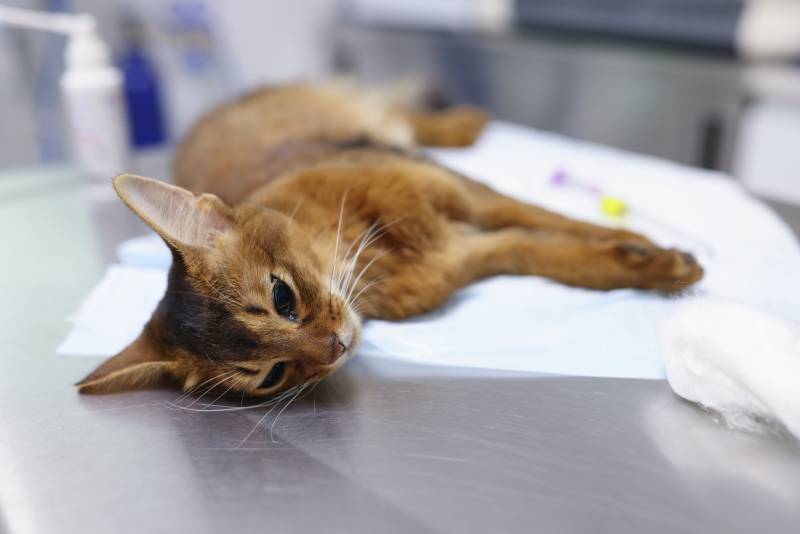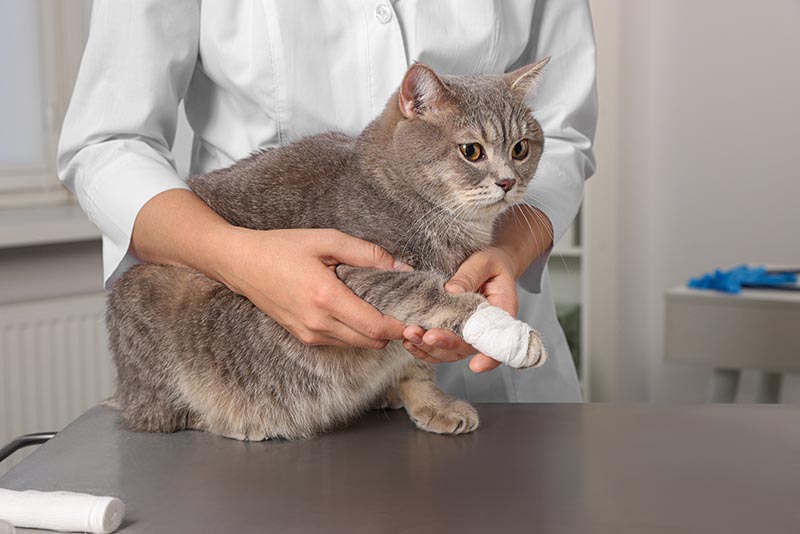Why Is My Cat Missing the Litter Box? 13 Vet-Reviewed Reasons & What to Do
Updated on
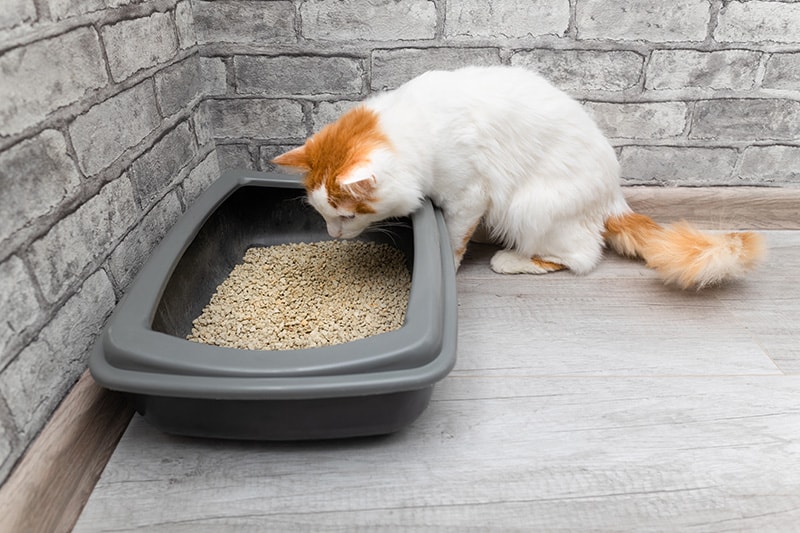
Click to Skip Ahead
If you suddenly start smelling cat urine in unexpected places, there’s a good chance your kitty is avoiding the litter box. To solve this problem, you first need to know why it’s happening in the first place. Cats avoid the litter box for several reasons, and although you can resolve some of the issues at home, other causes require veterinary assistance. Here are 13 reasons why your cat misses the litter box and what to do about them.
The 13 Reasons Your Cat Might Be Missing the Litter Box
1. The Litter Box Is Dirty
Let’s start with the simplest answer first: your cat might be missing the litter box because you haven’t been cleaning it. Cats have varying tolerance for dirty litter boxes but generally prefer to do their business in a clean spot.
If you find urine or feces outside the box, check to see if the litter needs scooping first. Generally, you should scoop the litter box at least once a day. However, you should completely change the litter as recommended by the manufacturer and wash the empty box when you do to help control odor.

2. They Don’t Like the Litter
Have you recently changed your brand of litter, and your cat is now missing the litter box? It could be because they disapprove of the new brand. Again, some cats are more tolerant of changing litter than others. However, with so many different litter textures and materials now available, a sudden switch can cause your cat to avoid the box.
Some cats will have trouble adjusting to the feel of a new litter. Others will run from the fragrance if you switch from unscented to scented. Try to be consistent about buying the same type of litter once your cat gets used to it. If you have to switch, make it a gradual transition, just as you would if changing your cat’s food.
3. They Don’t Like the Litter Box
Gone are the days when your only litter box options were various-sized plastic rectangles. Now, you can find covered litter boxes, boxes hidden in tasteful furniture, and automatic scooping boxes. If your cat has always used the same type of litter box, switching to a new one could lead to inappropriate elimination.
Some cats won’t tolerate a covered litter box, while others may be scared by the noise of an automatic scoop. If you want to transition litter boxes, consider leaving the old one in place for a while as your pet adjusts.

4. The Litter Box Is Too Small or Short
If you have a large cat, such as a Maine Coon, or a kitty who doesn’t squat down low to pee, they could be missing the litter box simply because it isn’t big or tall enough.
If you’re consistently finding urine on the wall or floor near your litter box, you may need a quick upgrade to solve the problem. Look for a covered litter box or one with high sides. Just make sure you transition the cat slowly to the new litter box, or they could still avoid it, as we discussed in the previous entry.
5. They Don’t Like Where the Litter Box Is Located
Your cat could be missing the litter box because they don’t like where you’ve placed it in the house. Generally, cats don’t like their litter boxes to be in a high-traffic area of the house, but they also don’t want to feel “trapped” while they’re using it.
Most cats (understandably) dislike having their toilet near their food and water bowls. Others may avoid litter boxes near noisy appliances, such as a washer or dryer.
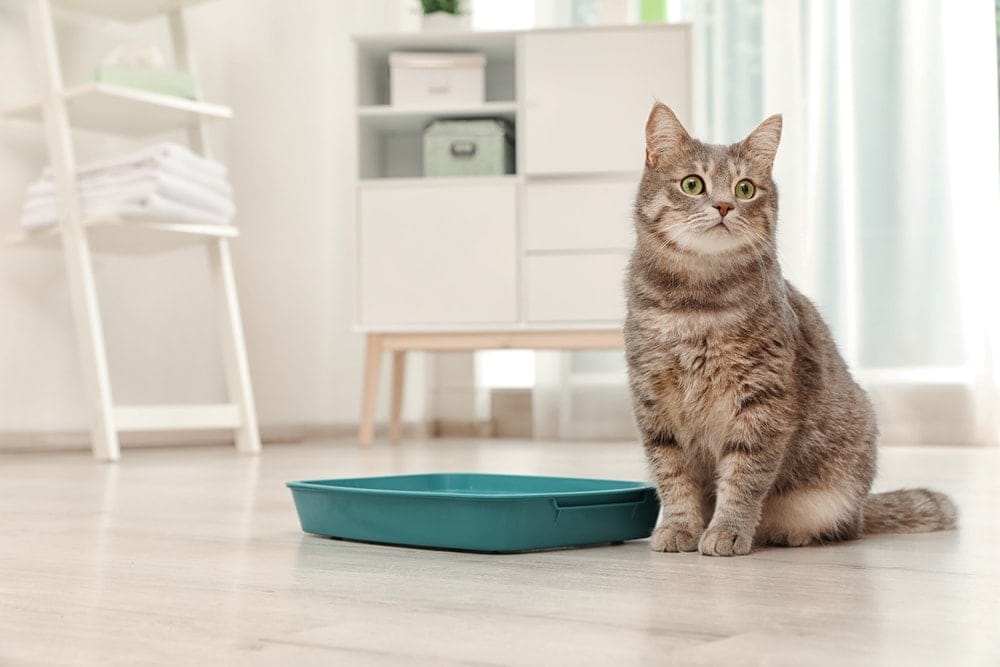
6. You Don’t Have Enough Litter Boxes
Vets and feline behavior specialists generally recommend providing enough litter boxes for every cat in the house, plus one extra. If too many cats try to use the same box, some of them may miss.
Keeping the box clean is also harder if you only have one for several cats. You can place litter boxes on all levels of your house so your cats can always get to one quickly to prevent accidents.
7. Your Cats Don’t Like Each Other
Conflict between household cats is another common reason kitties miss the litter box. Even if you have enough litter boxes, one cat may frequently bully another and not let them use one.
Cats are also territorial and will avoid each other’s “spots,” especially if they don’t get along. If all the litter boxes are in one cat’s territory, the others may be afraid to trespass, even if it means peeing somewhere inappropriate. Pay attention to where your cats tend to sleep and hang out, and ensure there’s a litter box nearby.

8. You Didn’t Clean Up the Last Accident Well Enough
Like dogs, cats prefer to use the same locations to do their business. They also have an instinct to urinate where other kitties have previously, even if it’s not in a litter box. Your cat could be missing the litter box because they smell a previous accident that wasn’t cleaned up properly.
Cats can smell much better than we can, and even if you don’t detect a urine odor, it doesn’t mean your kitty can’t. You can use an enzyme-based cleaner that fully breaks down stains and odors for the best results. You may need to repeat the cleaning process several times, especially if you’re dealing with an old accident site.
9. Your Cat Is Stressed
Stress and anxiety are among the most common behavioral reasons cats miss the litter box. Many cats don’t handle change well and start peeing inappropriately, surrounding themselves in their own scent as a way to cope. A new pet or family member could cause them to feel insecure and need to mark their territory.
If your cat starts peeing near doors or windows, they could be reacting to the presence of a stray kitty outside.
You can suspect stress if your cat starts missing the litter box after a change in their routine or environment. Stressed cats may also display additional signs such as overgrooming, hiding, or vocalizing excessively.
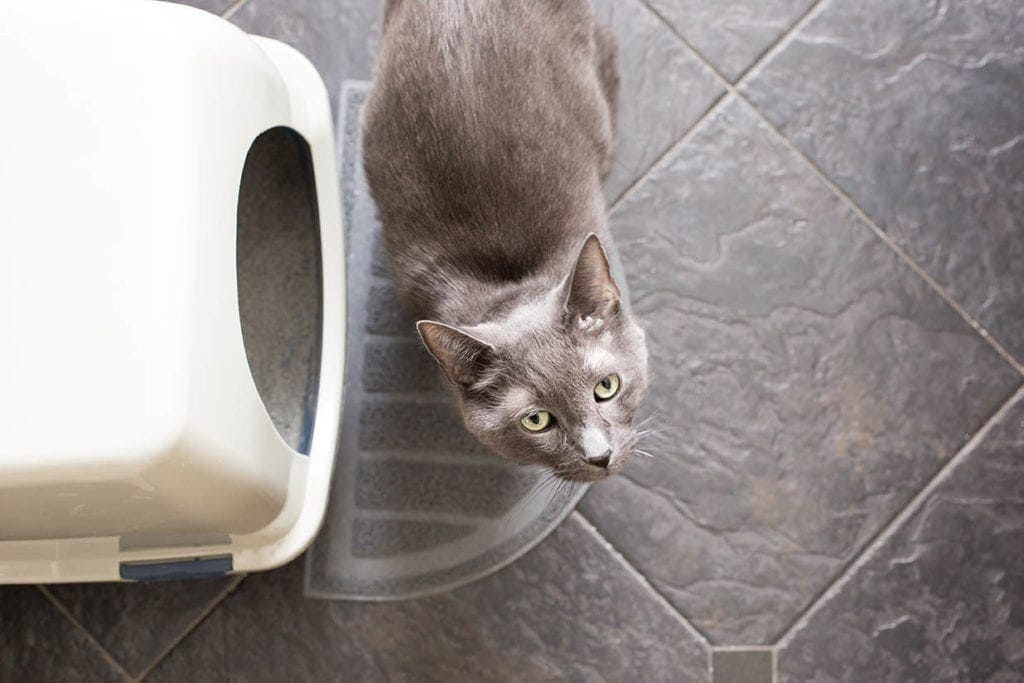
10. Your Cat Needs to Be Spayed or Neutered
Male cats that haven’t been neutered may deliberately miss the litter box because they’re spraying urine to mark their territory. This behavior is normal for unneutered males, who are hardwired to compete for mates with other males and want to make their presence known.
Female cats are less likely to spray for that reason. However, female cats in heat may also miss the litter box. Talk to your vet about spaying or neutering your cat, not just because it may help them stop missing the litter box, but for various health reasons, too.
11. Your Cat Is in Pain
In the wild, an injured or sick cat is a potential target for predators. Your cat retains the instinct to hide their pain, so it can be challenging to tell when they’re hurting. However, missing the litter box can be one indication that’s easy to overlook.
Cats suffering from back or joint pain may not be able to climb in and out of the litter box easily. Older cats that develop arthritis commonly start to miss the litter box for this reason. Look for other signs that your cat struggles to get around, such as limping or reluctance to climb stairs or jump.
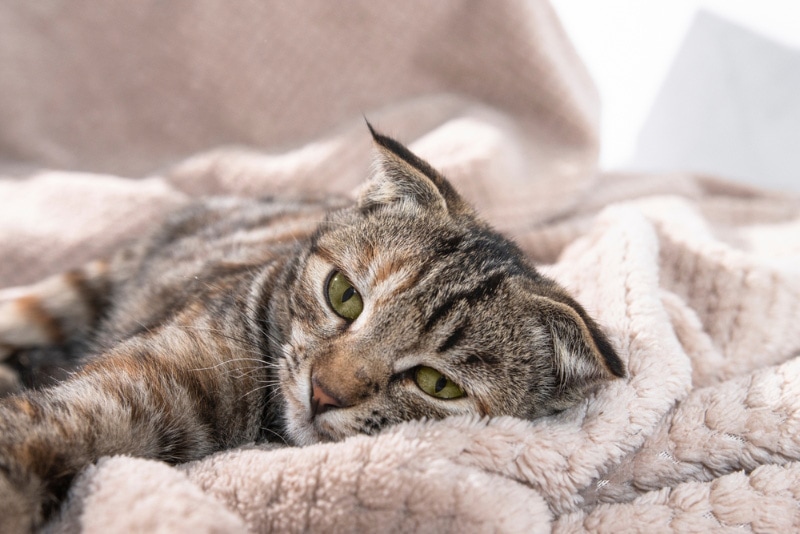
12. Your Cat Has a Medical Problem
Several medical issues could cause your cat to start missing the litter box. Urinary or kidney problems are among the most common. Urinating frequently and going outside the box can all be signs of urinary tract disease such as feline idiopathic cystitis (which can be stress related), urinary tract infections, bladder stones or kidney disease.
If you have a male cat, paying attention to their peeing habits is especially important because they are prone to developing life-threatening urinary obstructions. Cats with diabetes may drink and pee excessively, often missing the litter box as a result.
13. Your Cat Is Getting Old
Like older humans, aging cats can experience cognitive decline or dementia. One of the side effects of this age-related confusion is missing the litter box. Your older cat may forget where their litter box is located and urinate wherever they happen to be at the time.
They may also forget their litter box training entirely or lose control of their bladder or bowels. Generally, cats with age-related mental decline will display other signs, such as pacing and vocalizing, especially at night.
The 9 Things to Do If Your Cat Is Missing the Litter Box
As you can see, there are multiple reasons your cat could be missing the litter box. Finding the cause of this frustrating problem is rarely straightforward, but the following tips can help. Here’s what to do if your cat is missing the litter box.
1. Act Quickly
The faster you can determine why your cat is missing the litter box, the better chance you have of stopping it. You’ll have fewer accident spots to clean, and your cat won’t form a new habit that’s hard to break. Plus, behavioral and medical issues are typically easier to treat when discovered early.
2. Rule Out Medical Conditions First
No amount of changing litter or litter boxes will help solve inappropriate elimination if your cat suffers from a medical condition. The first step in determining why your cat is missing the box is to see your vet to rule out a treatable health problem first.
If you have a male cat, it’s especially urgent due to the risk of an obstruction. A male cat that isn’t peeing needs medical attention immediately.
3. Brainstorm with Your Vet
Once your vet rules out any medical cause for your cat missing the litter box, they can also help you brainstorm which environmental or behavioral issue you could be dealing with instead.
You can talk to your vet about any recent changes at home, your litter box location, the type of litter, the number of cats in the family, and how many boxes you have. Based on this discussion, your vet can help you determine what to try next to help your cat return to the litter box.

4. Make Environmental Changes
Environmental changes are usually the easiest and cheapest to implement. They include changing the litter, type of litter box, number of boxes, or where they are located. Unfortunately, this step can involve trial and error until you find the setup your cat prefers.
5. Make Sure Your Cat Isn’t Bored
You can provide your cat with daily physical and mental stimulation to help prevent behavior issues. Boredom can cause stress, which can lead to missing the litter box, as we discussed.
It’s best to spend one-on-one time with your cat every day. Ensure they have access to toys, scratching posts, and vertical spaces like cat trees. Consider providing supervised outdoor time in a safe, enclosed area or walking on a leash.
6. Consider Medications
If your cat struggles to adjust to a permanent change at home, such as a new baby or partner, you may need to consider referral to a feline behavior specialist. Sometimes medications, alongside a behavior modification program, may be needed.
7. Look for Invisible Urine Stains
As we discussed, it can be hard to clean older urine stains, leading your cat to miss the litter box in favor of those spots. It might not even be your cat to blame for the old spots.
If you move into a house or apartment whose previous feline inhabitants also missed the litter box, your cat could just be following their lead. Try using a black light to hunt for old pee stains.

8. Block Access
If your cat consistently returns to the same spot outside the litter box despite your best cleaning efforts, you may need to block access to the area entirely. Keep the door shut or restrict your cat to another part of the house. You can also use floor coverings like plastic, foil, or sandpaper to discourage your cat from returning to the dirty spot.
9. Don’t Take It Personally
While it can be tempting to think your cat has it out for you as you clean up yet another accident, that’s not what’s happening. Cats don’t have the mental capacity for concepts like revenge. As frustrating as the situation can be, don’t take it personally, and don’t react by punishing your cat. Punishment is ineffective and can worsen the problem by increasing your cat’s stress level.
Conclusion
While each of these 13 reasons why your cat is missing the litter box has a solution, correctly diagnosing which problem is to blame can be time-consuming and frustrating. Unfortunately, many cat owners lose patience and surrender their pets to animal shelters.
Before you give up on solving your cat’s litter box issues, remember that most are treatable and may even be as simple as switching your cat’s litter. Don’t hesitate to ask your veterinarian for help, and keep a good stain and odor remover handy.
Featured Image Credit: Oleg Opryshko, Shutterstock



